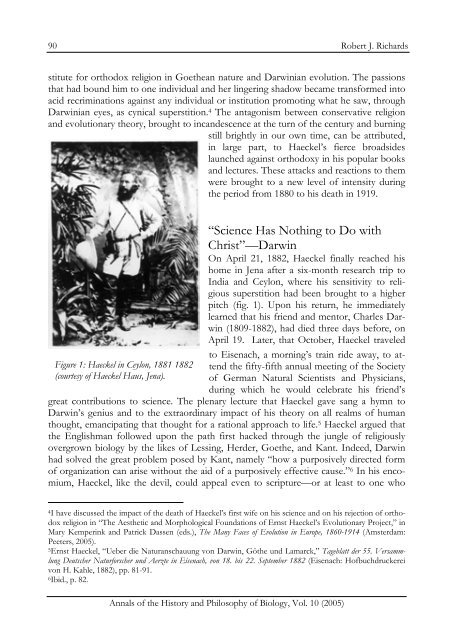Annals of the History and Philosophy of Biology
Annals of the History and Philosophy of Biology
Annals of the History and Philosophy of Biology
Create successful ePaper yourself
Turn your PDF publications into a flip-book with our unique Google optimized e-Paper software.
90<br />
<strong>Annals</strong> <strong>of</strong> <strong>the</strong> <strong>History</strong> <strong>and</strong> <strong>Philosophy</strong> <strong>of</strong> <strong>Biology</strong>, Vol. 10 (2005)<br />
Robert J. Richards<br />
stitute for orthodox religion in Goe<strong>the</strong>an nature <strong>and</strong> Darwinian evolution. The passions<br />
that had bound him to one individual <strong>and</strong> her lingering shadow became transformed into<br />
acid recriminations against any individual or institution promoting what he saw, through<br />
Darwinian eyes, as cynical superstition. 4 The antagonism between conservative religion<br />
<strong>and</strong> evolutionary <strong>the</strong>ory, brought to inc<strong>and</strong>escence at <strong>the</strong> turn <strong>of</strong> <strong>the</strong> century <strong>and</strong> burning<br />
still brightly in our own time, can be attributed,<br />
in large part, to Haeckel’s fierce broadsides<br />
launched against orthodoxy in his popular books<br />
<strong>and</strong> lectures. These attacks <strong>and</strong> reactions to <strong>the</strong>m<br />
were brought to a new level <strong>of</strong> intensity during<br />
<strong>the</strong> period from 1880 to his death in 1919.<br />
Figure 1: Haeckel in Ceylon, 1881 1882<br />
(courtesy <strong>of</strong> Haeckel Haus, Jena).<br />
“Science Has Nothing to Do with<br />
Christ”—Darwin<br />
On April 21, 1882, Haeckel finally reached his<br />
home in Jena after a six-month research trip to<br />
India <strong>and</strong> Ceylon, where his sensitivity to religious<br />
superstition had been brought to a higher<br />
pitch (fig. 1). Upon his return, he immediately<br />
learned that his friend <strong>and</strong> mentor, Charles Darwin<br />
(1809-1882), had died three days before, on<br />
April 19. Later, that October, Haeckel traveled<br />
to Eisenach, a morning’s train ride away, to attend<br />
<strong>the</strong> fifty-fifth annual meeting <strong>of</strong> <strong>the</strong> Society<br />
<strong>of</strong> German Natural Scientists <strong>and</strong> Physicians,<br />
during which he would celebrate his friend’s<br />
great contributions to science. The plenary lecture that Haeckel gave sang a hymn to<br />
Darwin’s genius <strong>and</strong> to <strong>the</strong> extraordinary impact <strong>of</strong> his <strong>the</strong>ory on all realms <strong>of</strong> human<br />
thought, emancipating that thought for a rational approach to life. 5 Haeckel argued that<br />
<strong>the</strong> Englishman followed upon <strong>the</strong> path first hacked through <strong>the</strong> jungle <strong>of</strong> religiously<br />
overgrown biology by <strong>the</strong> likes <strong>of</strong> Lessing, Herder, Goe<strong>the</strong>, <strong>and</strong> Kant. Indeed, Darwin<br />
had solved <strong>the</strong> great problem posed by Kant, namely “how a purposively directed form<br />
<strong>of</strong> organization can arise without <strong>the</strong> aid <strong>of</strong> a purposively effective cause.” 6 In his encomium,<br />
Haeckel, like <strong>the</strong> devil, could appeal even to scripture—or at least to one who<br />
4I have discussed <strong>the</strong> impact <strong>of</strong> <strong>the</strong> death <strong>of</strong> Haeckel’s first wife on his science <strong>and</strong> on his rejection <strong>of</strong> orthodox<br />
religion in “The Aes<strong>the</strong>tic <strong>and</strong> Morphological Foundations <strong>of</strong> Ernst Haeckel’s Evolutionary Project,” in<br />
Mary Kemperink <strong>and</strong> Patrick Dassen (eds.), The Many Faces <strong>of</strong> Evolution in Europe, 1860-1914 (Amsterdam:<br />
Peeters, 2005).<br />
5Ernst Haeckel, “Ueber die Naturanschauung von Darwin, Gö<strong>the</strong> und Lamarck,” Tageblatt der 55. Versammlung<br />
Deutscher Naturforscher und Aerzte in Eisenach, von 18. bis 22. September 1882 (Eisenach: H<strong>of</strong>buchdruckerei<br />
von H. Kahle, 1882), pp. 81-91.<br />
6Ibid., p. 82.

















